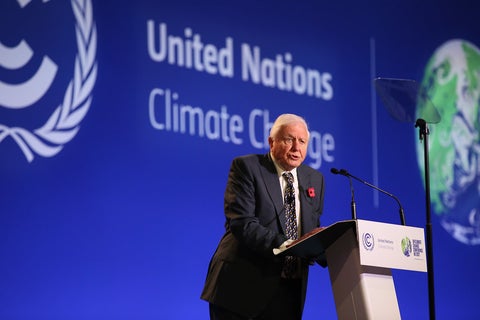“The world is looking at you,” said Sir David Attenborough while addressing the 26th Session of the Conference of the Parties (COP26) delegates at the World Leaders Summit; a quote that summed up the first few days of the UN Climate Change Conference. This year, it was clearer than ever that climate change was the most critical issue facing the entire planet and the pressures were high for world leaders.

Photo courtesy of the United Nations Framework Convention on Climate Change (UNFCCC).
So far, I had the opportunity to watch the World Leaders Summit, Indigenous Consultations, Climate Finance Day conversations and other side events. I heard country leaders speak about their country’s action plans and announce some of the most ambitious and unprecedented targets to date. For instance, more than 100 nations representing more than 85% of the world’s forests, including Canada, committed to end or reverse deforestation by 2030. Canada highlighted the importance of carbon pricing to support a transition to renewable energy and announced an investment into nature-based solutions. Different from previous years, world leaders announced actions with an increasing sense of urgency and mentioned that time was running out to prevent unlivable future conditions. These increasingly unfavourable conditions are already a reality for many developing countries and islands such as Barbados and Samoa. This inequity was a reoccurring theme in conversations, with developed nations focusing heavily on economic solutions to maintain prosperity while developing nations prepare to protect themselves against the effects of the climate crisis to which they contributed very little.
Climate finance, a potential mechanism to solve the inequity, was a large focus of COP26 and a subject I am interested in. Leaders strategized to raise the $100 billion needed to empower developing nations and broaden mobilization and alignment of financial flows for enabling climate action. This included conversations surrounding financial quantification of climate risks, financially rewarding countries that are successful in adaptation and mitigation, creating a pipeline to flow finances towards developing nations and the increasing demand for climate finance majors. For the first time, the private sector played an immense role in climate action with companies and banks coming together with the public sector to steer change.
My favourite part of the first few days was hearing and learning from Indigenous people around the world who consider the natural environment as a part of their identity. They shared their first-hand experiences of the changing climate. Some spoke about animals that were part of their forests for thousands of years disappearing suddenly due to climate-related impacts. Communities from Kenya shared how they are experiencing climate-related starvation due to failed rainy seasons. Despite the circumstances, Indigenous leaders spoke about how they never give up and will give back to the planet unconditionally because if we take care of it, it will take care of us. This philosophy offered hope, inspired me greatly and is something we can all learn from.
Overall, I have learned so much in the first few days of COP26. As the conference continues, I hope to learn more about the physical sciences, health and climate change, and energy transitions. I feel extremely motivated to create positive change and empower others to do the same. As Mia Mottley, Prime Minister of Barbados, put so nicely, “if our existence is to mean anything, then we must act in the interest of all people,” and that is what I intend to do as a youth leader.

Misha Patel is a Masters of Climate Change student at the University of Waterloo and attended the 26th Session of the Conference of the Parties (COP26) United Nations Climate Change Conference in Glasgow, U.K. during fall 2021. This is her reflection from participating as a student delegate during the first week of talks.